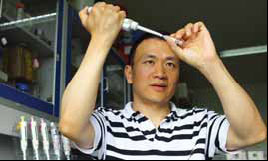Returned scientist finds opportunity back home
Updated: 2013-06-10 08:18
By Xu Xiao (China Daily)
|
||||||||
|
Song Xu, R&D director at the Chengdu Foregene Biotechnology Company. Zou Hong / China Daily |
Song Xu is a busy man these days.
Song divides his time between teaching classes at Sichuan University and his work as R&D director at the Chengdu Foregene Biotechnology Company.
He and the company he founded specialize in two technologies. The first is called DNA single-column technology, which is exclusively produced by his company.
The second is called Direct PCR. It can be used to determine if food is pure or contaminated.
This technology could be used by quality inspectors to detect the adulterants in some food.
In 2006, Song came back with a doctorate from Yale University to teach at Sichuan University, where he had gotten his undergraduate and master's degrees.
While teaching and conducting scientific research, he found that almost all the high-end agents are imported. He resolved to change this by creating his own business.
With the help of two former classmates who now work in financing and investment, Foregene was established in April 2011, with an initial investment of 2.3 million yuan ($371,000).
Now investments total more than 6 million yuan. Almost all of the 30 staff members of the company are Chinese who have returned from overseas.
Currently, two leading experts in genetically modified rice use Foregene's agents. One is Yuan Longping, who has been nicknamed the "father of genetically modified rice", and the other is Zhang Qifa, a professor at Huazhong Agricultural University in Wuhan, capital of Central China's Hubei province.
"The Chengdu government provides us excellent services, and I'm very satisfied," Song said. The local government has done everything to accommodate the company, he also noted.
"Investors in Chengdu are more willing to support those companies at the beginning level or that are rather mature. So it is relatively tougher for companies at the middle level, like us," he said.
He told reporters that the 2013 sales goal is to reach some 5 million yuan in sales revenue. He said he hopes to attract large investments to help the company capture a greater share of this potentially lucrative market.
His goal is to achieve a 30 percent domestic market share in the next three to five years.
Song said a lot of his colleagues are returning from overseas because they see new opportunities back home.
"In the US, it is relatively more stable. You can envision what you will be like in a couple of years. In China, there are more changes, and of course, more chances," he said.
"Biological companies in China lag behind those in some overseas countries, but actually there is not that much of a difference between good universities here and their competitors abroad."
Song has a lot on his plate, heading the company's research division while tutoring some 20 graduate students.
"I have had some problems making the transition from being a scholar to being a businessman," he said.
For example, old friends have become clients. Also, he said that in school he was more concerned with the theoretical implications of his research, but as the head of a company, he must think more about commercial application.
"As an overseas returnee, I think the most important thing is looking toward the future," he told reporters.
xuxiao@chinadaily.com.cn
(China Daily USA 06/10/2013 page16)

 Michelle lays roses at site along Berlin Wall
Michelle lays roses at site along Berlin Wall
 Historic space lecture in Tiangong-1 commences
Historic space lecture in Tiangong-1 commences
 'Sopranos' Star James Gandolfini dead at 51
'Sopranos' Star James Gandolfini dead at 51
 UN: Number of refugees hits 18-year high
UN: Number of refugees hits 18-year high
 Slide: Jet exercises from aircraft carrier
Slide: Jet exercises from aircraft carrier
 Talks establish fishery hotline
Talks establish fishery hotline
 Foreign buyers eye Chinese drones
Foreign buyers eye Chinese drones
 UN chief hails China's peacekeepers
UN chief hails China's peacekeepers
Most Viewed
Editor's Picks

|

|

|

|

|

|
Today's Top News
Shenzhou X astronaut gives lecture today
US told to reassess duties on Chinese paper
Chinese seek greater share of satellite market
Russia rejects Obama's nuke cut proposal
US immigration bill sees Senate breakthrough
Brazilian cities revoke fare hikes
Moody's warns on China's local govt debt
Air quality in major cities drops in May
US Weekly

|

|








